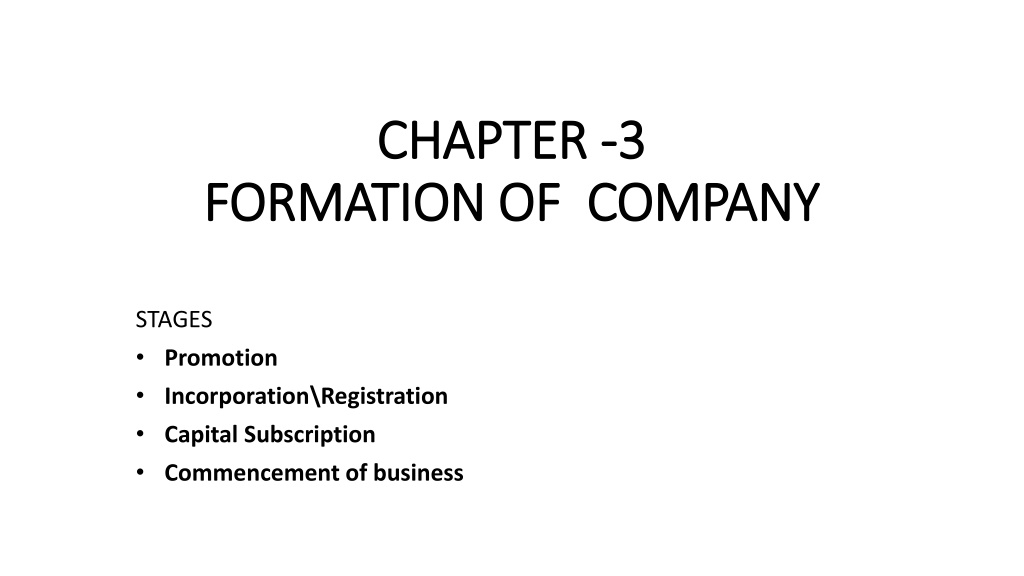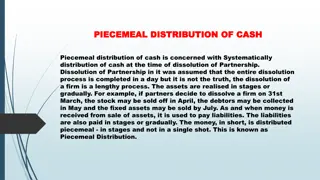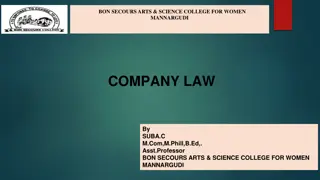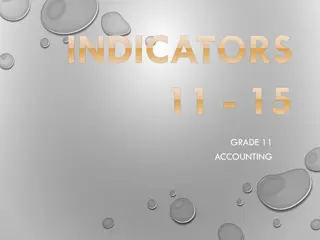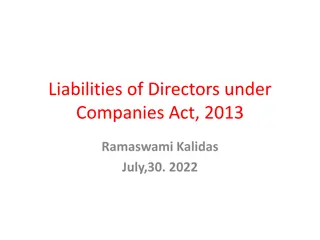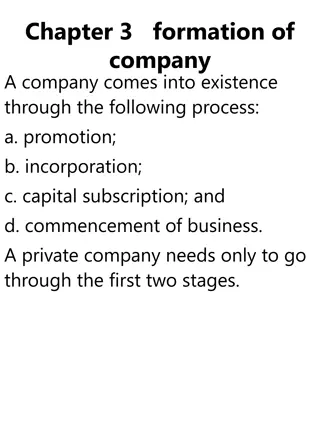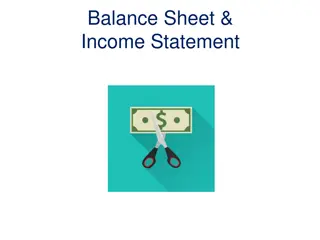Understanding the Role and Liabilities of Promoters in Company Formation
Promotion in the formation of a company involves the initial groundwork by a promoter, who assembles funds, property, and managerial expertise. Promoters have a fiduciary duty towards the company and original shareholders, necessitating full disclosure of all material facts. They can be held liable for making secret profits, fraud, misrepresentation in prospectus, and breach of fiduciary duties. Understanding the legal position and liabilities of promoters is crucial in company formation.
Download Presentation

Please find below an Image/Link to download the presentation.
The content on the website is provided AS IS for your information and personal use only. It may not be sold, licensed, or shared on other websites without obtaining consent from the author. Download presentation by click this link. If you encounter any issues during the download, it is possible that the publisher has removed the file from their server.
E N D
Presentation Transcript
CHAPTER CHAPTER - -3 3 FORMATION OF COMPANY FORMATION OF COMPANY STAGES Promotion Incorporation\Registration Capital Subscription Commencement of business
PROMOTION PROMOTION involves discovery of idea\ business opportunity investigation of the feasibility of the idea assembling of business elements i.e organising funds,property, and managerial ability into a business concern Person who does all this preliminary work is called PROMOTER. Sec.2(69) of Companies Act 2013 defines promoter. According to the definition, a promoter means a person has been named as such in the Prospectus or in the Annual Return Who has control over the affairs of the company directly or indirectly, whether as shareholder or director or otherwise on whose advice, directions or instructions the BOD is accustomed to act. The proviso to this section says that the persons assisting the promoter in professional capacity ,e.g.as solicitors, accountants, counsels, experts ..are not promoters. A promoter may be individual, a firm , an association of persons or even a company.
LEGAL POSITION OF A PROMOTER *neither trustee nor agent of the company as there is no trust or principal in existence during promotional stage *stands in your a fiduciary position( position of trust and confidence) towards the company and original allotee of shares.Therefore A PROMOTER MUST MAKE FULL DISCLOSURE OF ALL MATERIAL FACTS TO AN INDEPENDENT BODY OF DIRECTORS OR SHAREHOLDERS i.e.- must not make SECRET PROFITS (law doesnot prohibit making of profits, it prohibits nondisclosure of it) and the disclosure should be made to independent board of directors\shareholders.Case- Gluckstein vs. Barnes
Promoters Liability Promoters Liability 1. If secret profit is made by promoter, then the company can *recover it from promoter along with interest, or, * the company can set aside that transaction, restore the property back to the promoter and recover its money *company can sue him for damages for his fraud or breach of fiduciary duties 2.Liability on Preliminary Contracts *the promoter is personally held liable on preliminary contracts\preincorporation contracts 3.Fraud in formation of the company. * liable for fraud u\s 447- If at the time of promotion of a company, the promoter furnishes any false \incorrect information suppresses any material information knowingly * liable for misfeasance or breach of duty u\s 340-.If in the course of winding up,on an application made by liquidators ,it appears to Tribunal that the promoters had misapplied\embezzled any property or money , the Tribunal can make him liable and take necessary action( i.e.it may order them to repay\restore such money\ property along with interests \compensate for it) *public examination u\s 300 - the promoter may be subject to public examination by Tribunal if during the winding up of the company ,the liquidator alleges him for fraud at the time of promotion\formation\ conduct \ business of the company 4.Misrepresentation in Prospectus *he is liable to original allotees of shares for misstatements\misrepresentations in prospectus.(civil as well as criminal liability u\s 35 and 34 respectively ) Accordingly he would be liable to penalty in the form of damages or imprisonment or fine. 5. Joint and Several Liability *liability of promoters is joint and several . If one of them pays damages, he can recover contribution from other copromoters. In jointly- means that the aggrieved party can make all the promoters party to the dispute . Severally means the aggrieved party can sue any of them. In that case if that promoter who was sued, pays damages, he can recover the contribution from other copromoters. In case of death his estate is liable and incase of insolvency, company can prove its claim from official assignee.
Promoters Remuneration Promoters Remuneration . A promoter puts in lot of efforts and incurs the initial expenses in the process of formation of company .Therefore he A promoter puts in lot of efforts and incurs the initial expenses in the process of formation of company .Therefore he deserves the reimbursement of preliminary expenses incurred as well as remuneration for the work done by him. deserves the reimbursement of preliminary expenses incurred as well as remuneration for the work done by him. 1.Ways of remunerating promoters. *The remuneration may be paid for his services in lumpsum in cash, or partly in cash and partly in shares \debentures of the company.*He could also be remunerated by way of commission on purchase price of business taken over by the company.* He may sell his own property to company at a profit provided he discloses it to an independent body of directors or shareholders. 2. However, there is no contractual obligation on the part of the company to pay him for these unless the co. has expressly agreed to pay after its formation for the services rendered by him. 3. A promoter cannot file a suit in court for recovery of his remuneration and other preliminary expenses incurred by him because he acted for a person who is yet to take birth. 4.The claim for expenses should be supported by vouchers and should be placed before the directors of the company when formed. 5.The remuneration paid to promoters should be disclosed in the prospectus issued by the company.
Preliminary or Pre Preliminary or Pre- -incorporation Contracts incorporation Contracts These are contracts entered in to by promoters with third parties to acquire some These are contracts entered in to by promoters with third parties to acquire some property or right for the company before its incorporation. property or right for the company before its incorporation. 1.Such contracts are not legally binding on the company i.e. company can neither sue other party nor be sued by the other party on such contracts.So, promoters will continue to be personally liable for pre- incorporation contracts This is because before incorporation , a company is a non-entity and for a valid contract two consenting competent parties are must. 2.The company cannot even ratify the preincorporation contracts after its incorporation because the doctrine of ratification requires existence of principal ,competent to contract at the time of entering into the contract whereas company was non-existant during that time. 3. The only way of adopting preliminary contract is by novation i.e. entering into new contracts with third parties on same terms as were embodied in the original contract. So, generally promoters simply agree to draft contract to be finally entered into by vendor and the company after the incorporation. Thus a new contract embodying the terms of the old one is made afresh by the company after its incorporation. Case. Natal Land &Colonisation Co. Ltd. vs. Pauline Colliery Syndicate Ltd. 4. However, if contracts are covered under Sec.15(h) and 19(e) of Special Relief Act,1963, they may be specifically enforced by or against the company. Thus, if a contract is for the purposes of the company (is with in the object clause) )and is warranted by the terms of incorporation (necessary for incorporation) and the company has accepted the contract and communicated its acceptance to the other party, then only such contracts will be binding .Case Imperial Ice Manufacturing Co. vs. Manchershaw
IMPERIAL ICE MANUFACTURING CO. VS MANCHERSHAW IMPERIAL ICE MANUFACTURING CO. VS MANCHERSHAW The promoters of an ice manufacturing company entered into a contract with M for purchase of ice manufacturing machinery for the company. The company on its formation, subsequently adopted the contract and sent the communication of its acceptance to M. It was held that the contract was for the purposes of the company and therefore ,enforceable by and against the company.
NATAL LAND & COLONISATION CO. LTD. VS NATAL LAND & COLONISATION CO. LTD. VS PAULINE COLLIERY SYNDICATE LMT. PAULINE COLLIERY SYNDICATE LMT. Natal co, entered into a contract with A who was acting as the nominee of the syndicate ( which was not then registered), to grant lease of certain mining property for 3 years. After registration the syndicate sued the Natal co. for the specific performance of the agreement to grant a lease. It was held that the syndicate co, was not entitled to claim the lease as it was not in existence when the contract was signed and a company cannot obtain the benefit of a preincorporation contract unless a new contract is made by the co. after its incorporation.
IInd IInd Stage Stage: INCORPORATION OR REGISTRATION Incorporation means registration of the company with the ROC. To get registration, the promotor , takes the following preparatory steps - ascertains from the ROC, the availability of proposed name of the new company obtains Letter of Intent (Industrial Licence) , if business comes within the purview of Industries(Development and Regulation)Act,1951 to fix up with auditors, bankers, solicitors, underwriters, signatories to MOA etc. to get MOA and AOA prepared and printed Section 7 of the Companies Act ,2013 is on incorporation. Its various subsections cover the entire procedure of incorporation and the related aspects .
Registration of a company As per Section7(1) ,The promoter is required to submit with the ROC of the State , where the registered office of the company is to be situated, the prescribed fees and the following documents\ information application for the registration of the proposed company MOA of the proposed company signed by all subscribers AOA of the proposed company signed by all the subscribers Compliance Declaration made by advocate\CA\CS\CWA involved in company's formation and by a person named as director\mgr\secretary stating that all requirements of the Act and related Rules wrt registration have been complied with Subscribers Declaration made by each of the subscribers and also from all first directors that they are not guilty of any company related offence\fraud\misfeasance\breach of duty during the preceding 5 years and that all the information provided to ROC is correct and complete Address for correspondence till its registered office is established and address finalised Subscribers particulars i.e their names, addresses, nationality, ID proofs and other particulars Directors particulars i.e. their names, addresses, nationality,ID proofs, DIN and other particulars Written Consent of directors of the proposed company to act in that capacity Particulars of directors' interest in other companies, firms and body corporates Now, application for incorporating a company shall be made online in (SPICE plus i.e. Simplified Proforma for Incorporating Companies Electronically) along with e- MOA in Form No. INC-33 and e-AOA in Form No.34. SPICE form is an integrated web form in which application for allotment of DIN upto 3 directors, reservation of name of company, appointment of Directors of the proposed company and application for registration can all be made together and there is no need to apply separately for any of these matters.
Registration of a company As per section7(2), the ROC, will then register the above documents and will issue the Certificate of Incorporation in prescribed form. This is the birth certificate of the company which bears the name, date of incorporation, CIN number and seal of that ROC.Now, Certificate of Incorporation can be issued electronically under the digital signatures of the ROC. As per section7(3), the ROC will also allot to the company a corporate identity number ,which shall be a distinct identity for the company and is also mentioned in Certificate of Incorporation. As per section 7(4), the company is required to maintain and preserve at its registered office copies of all the documents originally filed with the ROC for registration , until dissolution. As per section 7(5), if any person furnishes any false\incorrect information\suppresses any material information in any of the documents filed with the ROC , then he shall be liable for fraud u\s 447 and be punished.
Registration of a company As per section 7(6), if a company got incorporated on the basis of documents which contained any false\incorrect\insufficient information etc., then the promoters, the directors and the persons who made compliance declaration will be liable for fraud u\s 447 and punished. As per section 7(7), in case the company got incorporated on the basis of false\incorrect information etc. and the case goes to NCLT, then the tribunal can also pass the following orders order any change in MOA or AOA keeping in view interest of co., members and public direct that the liability of the members be unlimited direct the removal of name of the company from Register of companies pass an order for winding up of the company pass such order as it thinks fit EFFECT OF CERTIFICATE OF REGISTRATION -As per section 9 of Companies Act,2013 , from the date of incorporation mentioned in the Certificate of Incorporation subscribers to memorandum become members of the co. it gets status of a body corporate known by the name contained in Certificate of incorporation and gets power to hold\buy \sell assets \ enter into contracts \ sue and be sued in its own name shall have perpetual succession
CONCLUSIVENESS OF CERTIFICATE OF CONCLUSIVENESS OF CERTIFICATE OF INCORPORATION INCORPORATION Under judicial interpretations , it had been well recognised that the Certificate of Incorporation once issued is conclusive evidence that the company has been duly registered. Case -Jubilee Cotton Mills Ltd. vs. Lewis. The validity of the Certificate of Incorporation could not be disputed on any grounds whatever. So, once the Certificate of Incorporation had been issued , it was presumed that all the requirements of that Act had been complied with . No one could challenge the incorporation of the company even if irregularities prior to registration are subsequently discovered(e.g. it was found that the signatures in the registration documents were forged, or signatories were incompetent to contract , unauthorised alterations were made in documents by promoters , subscribers of MOA were not even seven in number etc.).This concept was also established in cases such as Moosa Gulam Ariff vs Ebrahim Gulam Ariff .
Certificate of Incorporation However, The Companies Act, 2013 doesn't contain any provisions with respect to 'Conclusiveness of Certificate of Incorporation'. Once a company got registered, and subsequently it comes to the knowledge of authorities that the company had furnished false \incorrect\ insufficient information in the documents filed at the time of incorporation , then as per sec. 7(6) of the Companies Act,2013, the promoters\first directors of the company shall be liable for fraud u\s 447 and be punished with imprisonment and fine. Similarly u\s sec. 7(7) of the Act, the TRIBUNAL is empowered in that case, to order winding up of the company or order the striking off of the name of the company from the register of companies etc. SO, THE CONCEPT OF CONCLUSIVENESS OF CERTIFICATE OF INCORPORATION HAS LOST ITS RELEVANCE UNDER COMPANIES ACT 2013. IF IT IS PROVED THAT THE COMPANY GOT INCORPORATED ON THE BASIS OF DOCUMENTS CONTAINING FALSE OR INCORRECT INFORMATION OR IN ANY FRAUDULANT MANNER, THEN SECTION 7(7) , ALLOWS THE REGISTRAR TO QUESTION THE VALIDITY OF PROCEEDINGS PRIOR TO INCORPORATION AND TAKE NECESSARY ACTIONS.
IIIrd IIIrd Stage: CAPITAL SUBSCRIPTION Stage: CAPITAL SUBSCRIPTION In this stage, the company arranges capital for its activities. Since a private company is prohibited from inviting public for subscription of its securities, such companies offer securities to a select group of persons through private placements.Thus, a private company need not pass through this stage of capital subscription. A public company ,on the other hand, can arrange capital either through private placement or through public issue.When the amount of capital required is huge and the company decides to raise capital from public issue, it is required to fulfill the requirements of not just the Companies Act but also SEBI. SEBI is empowered to make rules and regulations to regulate the issue of capital to public and to protect the interest of the investors.In this regard, it has formulated SEBI (Issue of capital and Disclosure Requirements) Regulations,2009 to be complied by public companies making a public offer of its securities.
IIIrd IIIrd Stage: CAPITAL SUBSCRIPTION Stage: CAPITAL SUBSCRIPTION Accordingly, the public companies have to follow the prescribed procedure- an offer to public can be made only through prospectus the directors have to carefully prepare prospectus and file its copy with the ROC thereafter, prospectus is put in circulation and public is invited on the basis of prospectus , applications for securites are received from public and the application money is kept in a separate bank account if prescribed minimum subscription is not received within the stipulated time period, all the application money received will be refunded forthwith to the applicants and no allotment can be done. if prescribed minimum subscription is received within the stipulated time period and other conditions of valid allotment are fulfilled, the directors pass formal resolution of allotment. Allotment letters are posted, Return of Allotment is filed with ROC, and share certificates are issued to allottees in exchange of allotment letters
IVth IVth Stage: COMMENCEMENT OF BUSINESS Stage: COMMENCEMENT OF BUSINESS- - The Companies (Amendment) Ordinance,2018 has reintroduced the requirement on part of companies ( whether public or private) to fulfill certain formalities before commencing its businesses. Accordingly, a company will not be entitled to commence its operations or exercise borrowing powers unless it has filed with the ROC- a declaration (within 180 days of its incorporation )stating that the subscribers to that MOA have all paid up on their shares and - a verification ( within 30 days of its incorporation)of its registered office address. If the company fails to comply with this requirement, then it shall be liable to penalty and in extreme cases, it could lead to removal of the companies' name from the Register of Companies. Borrowing powers mean power to borrow on loans, debentures etc.
PROVISIONAL CONTRACTS PROVISIONAL CONTRACTS Provisional Contracts - These are the contracts entered into by a company after obtaining Certificate of Incorporation but before becoming eligible to commence business. Such contracts are not legally binding upon the company until it becomes eligible for the commencement of business. After a company fulfills the requirements such as- filing the declaration of subscribers and verification of office address within the stipulated time-as are necessary for being eligible to commence operations, these contracts become automatically binding on the company. Difference in preliminary contracts and provisional contracts- PRELIMINARY CONTRACTS PROVISIONAL CONTRACTS These contracts are made before the registration of the company These contracts are made after registration but before fulfilling requirements u/s 10A The company can neither sue nor be sued to enforce the preincorporation contracts The company cannot be sued for enforcing a provisional contract till it becomes eligible for commencement of business. Preliminary contracts can be made binding by ratification if covered u\s 15h and 19e of Special Relief Act, 1963 Provisional contracts become binding as soon as company becomes eligible for commencing business and do not require any ratification. Special Relief Act,1963 governs preincorporation contracts Companies Act,2013 governs provisional contracts by inserting sec.10A Promoters are liable on preincorporation contracts unless covered under Special Relief Act. Company is liable on provisional contracts but only after getting eligibility for commencement.
ON LINE REGISTRATION OF COMPANY (Using SPICE +) ON LINE REGISTRATION OF COMPANY (Using SPICE +) 1. Web Form SPICE + has two parts-Part A (for name reservation of new companies) and Part B offering bouquet of services viz. Incorporation ; DIN allotment; Mandatory issue of PAN; Mandatory issue of TAN; GSTIN; ESIC registration; EPFO registration ; Professional Tax Registration ;Opening of Bank account 2. File Part A of Web Form SPICE+ for name reservation. Two names can be proposed in it. However ,if filling Part A and Part B simultaneously, then propose only 1 name. 3. File Web Form SPICE+ for OPC/ Private/ Public co. within 20 days of name approval 4. Apply for DIN for upto 3 directors in the SPICE+. Also application for PAN and TAN can be made through SPICE + only. 5. Prepare e- MOA in Form No.INC-33 and e-AOA in Form No.INC- 34. Sign and witness them digitally and file along with SPICE+ 6. Attach Web Form AGILE PRO ( INC-35) containing Application for registration for GSTIN,ESIC, EPFO, Professional Tax, Opening of Bank Account 7. Attach To SPICE+ --Form No. INC-8( Compliance Declaration), INC-9 ( Subscribers Declaration), DIR-2 ( Directors consent) ,Compliance Declaration by first directors 8. The particulars of subscribers like their names, addresess,ID proofs etc. and particulars of directors like their names, addresses, IDs, interest in other companies etc. will be filled up in the relevant sections of SPICE +. 9. For verification of office address, file Form NO. INC-22 within 30 days of incorporation 10. ROC will examine the form and if finds it defective, inform the applicant and ask him to resubmit within 15 days. If again on resubmission not satisfied, applicant must remove defects and resubmit again in 15 days. If ROC finds everything in order, then Certificate of Incorporation in Form No. INC-11 is generated which will contain Name of the Co., CIN, PAN, TAN and Date of Incorporation.
ON LINE REGISTRATION OF COMPANY (Using SPICE +) ON LINE REGISTRATION OF COMPANY (Using SPICE +) ABBREVIATIONS USED SPICE + - Simplified Proforma for Incorporating the Company Electronically CIN- Corporate Identity Number PAN- Permanent Account Number TAN- Tax deduction Account Number EPFO Employees Provident Fund Organisation registration number ESIC- Employees State Insurance Corporation registration number DIN- Director Identification Number GSTIN- Goods and Services Tax Identification number
